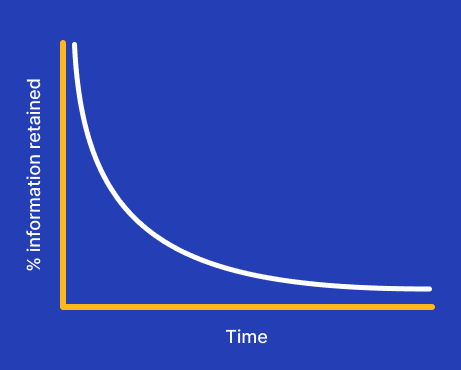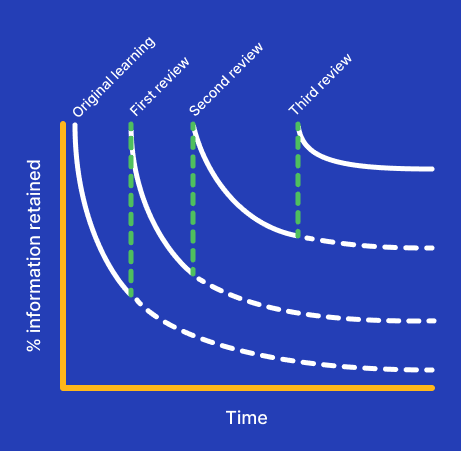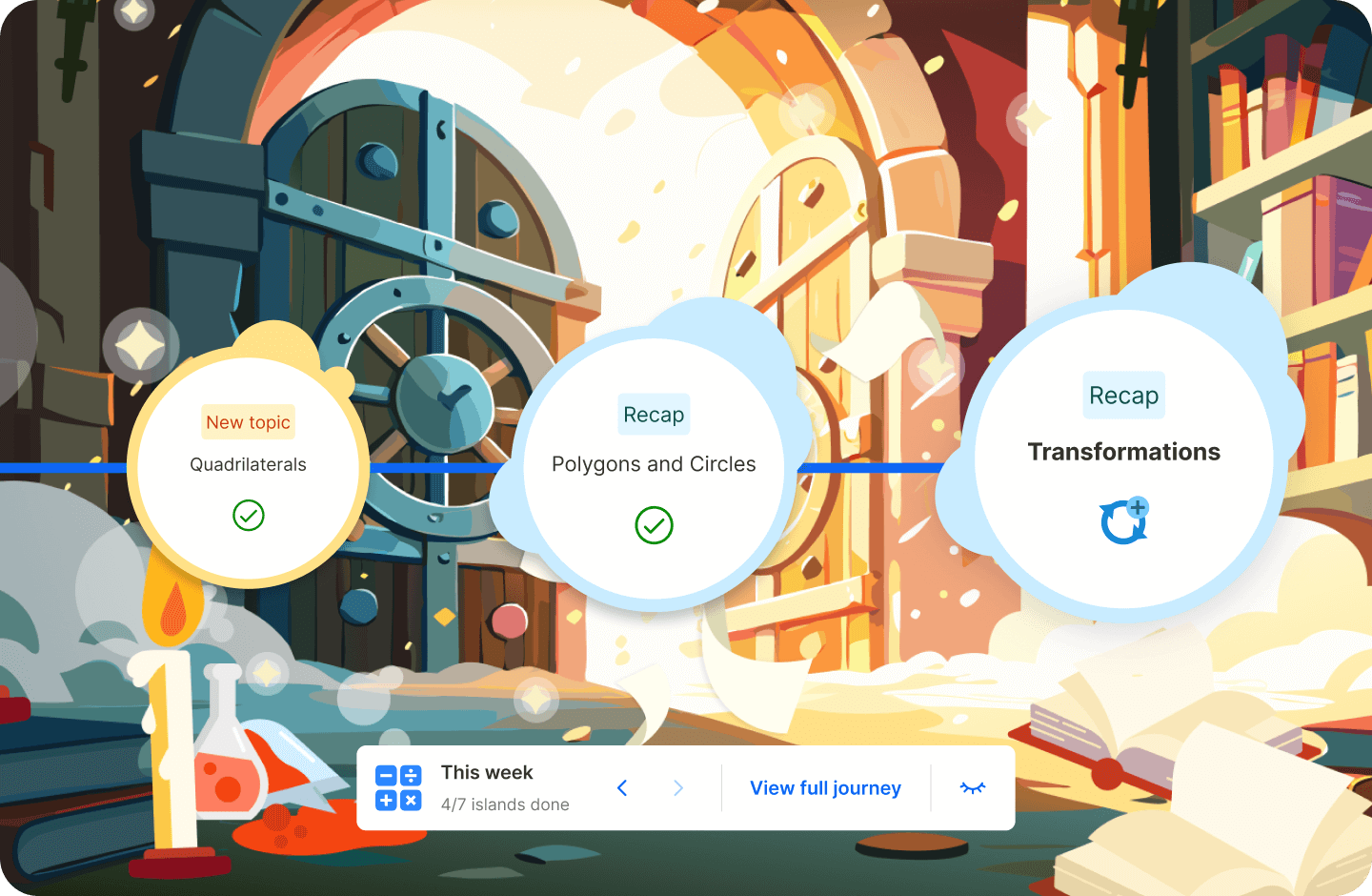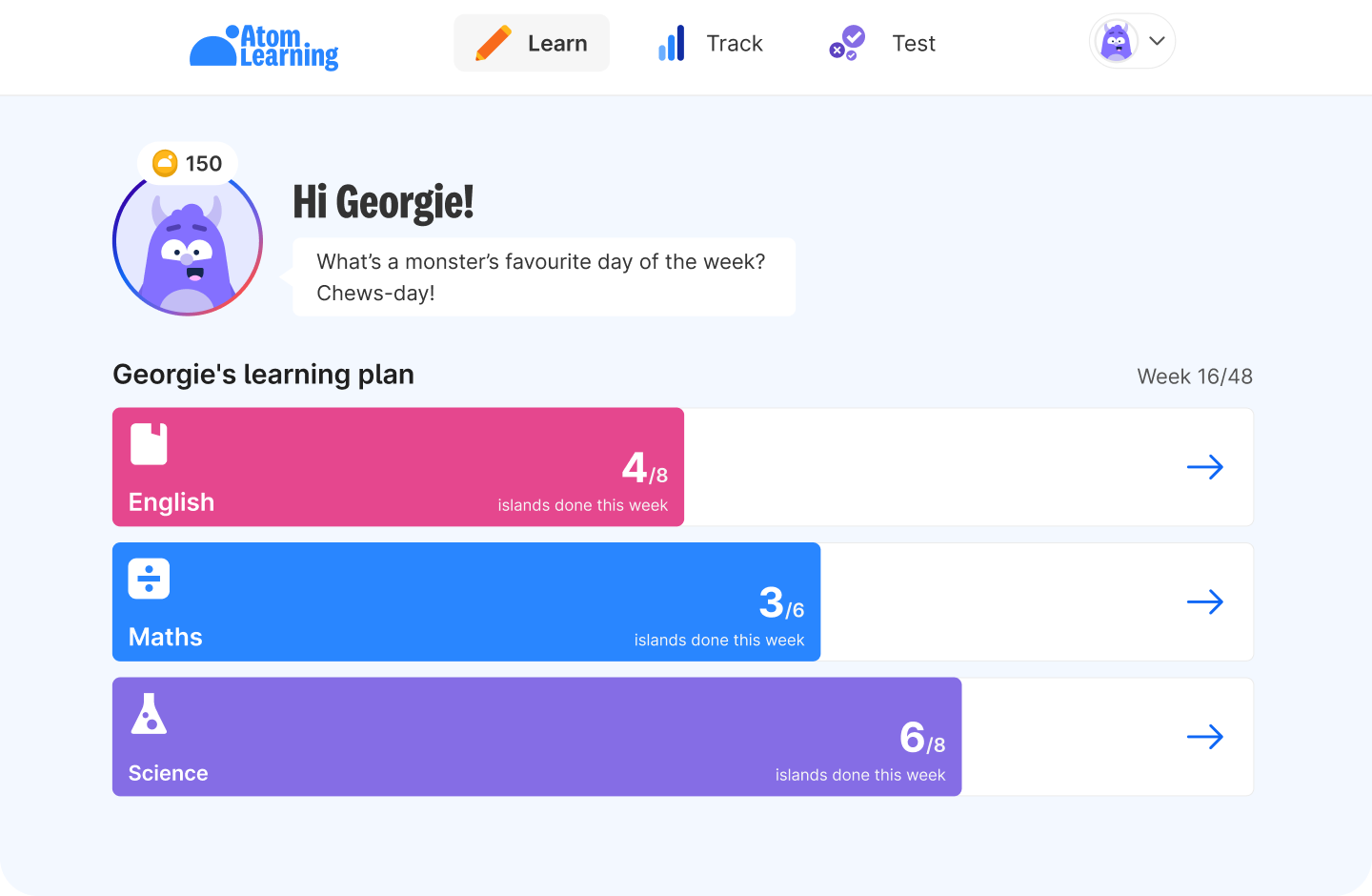The Forgetting Curve: how to boost your child's memory

Does your child struggle to remember things they've learned? You’re not alone. Here’s all you need to know about the Forgetting Curve – and what to do about it!
How do we forget?
When we learn something new, like a skill, a method or a fact, it’s stored in our brain as a memory. But unless we take steps to reinforce the memory, it weakens over time. As time goes on, we remember less and less of what we learned.
Psychologist Hermann Ebbinghaus created a model called the Forgetting Curve to show how a new memory gets weaker over time.

Ebbinghaus's Forgetting Curve
The biggest drop in memory happens very soon after your child learns something new. There’s a steep fall at the start of the Forgetting Curve.
Without reviewing what they’ve learned, children can forget up to 50% of it by the end of the day! And by the end of the week, they’re likely to have forgotten up to 90%.
The Forgetting Curve happens to us all. But the good news is, there are plenty of things you can do at home to support your child’s long-term memory. Using these tips will help them embed their learning so they can recall it with ease when needed.
1. Use spaced learning
Spaced learning is one of the most effective ways to slow down the rate at which children forget new information. It involves retrieving the information at key moments in the Forgetting Curve.

The Forgetting Curve is significantly slowed by regular reviews
You can slow the Forgetting Curve by reviewing the learning at regular intervals. It’s most effective to do this when your child’s recall has slipped but not to the point that they’re starting afresh. It’s normal for your child to forget things after each review, but it will happen a lot more slowly than without review.
Spaced learning is most effective when the information is presented in different ways and in small chunks. Keep your child engaged by using a blend of formats for short review sessions:
- Ask them questions about what they’ve learned.
- Research more about a topic together.
- Set activities and problems for them to solve on their own.
2. Make it meaningful
It’s much easier to remember things that have meaning to us. Often, remembering involves association – linking ideas by shared characteristics. When something isn’t meaningful, we can’t rely on associations to aid our memory.
During his research, Ebbinghaus found that meaningful words were easier to remember. He didn’t want this to affect his results, so he used nonsense syllables such as ZUC and QAX. As you might expect, these were a lot harder to remember because he had nothing to associate them with.

Hermann Ebbinghaus and some of his nonsense syllables
Likewise, if your child finds a lesson boring or incomprehensible, their memory of what was taught will fade quickly. So whether learning in the classroom or at home, information should be relevant and engaging.
If we’re given too much information at once, or too many tasks at once, our working memory gets overloaded. We're more likely to remember information when communication is clear and simple, and so cognitive overload is avoided.
Children have been found to be particularly vulnerable to this effect. So, to give them the best chances of processing and retaining new information, we need to be careful to keep cognitive load to a minimum. (Learn more about cognitive load theory in teaching here.)
3. Challenge their memory
If your child can’t remember something they’ve learned, encourage them not to feel disheartened. This isn’t a failure, it’s completely normal – and it’s actually the most effective time to stretch their learning. Anything they recap during this stage will be stronger as there’s a greater mental challenge involved.
When reviewing a topic with your child, make their learning as active as possible. For example, when you’re reading together at home, ask them questions about the text, and encourage them to ask you questions too. Ask them to explain the passage afterwards in their own words – this is so valuable for improving their confidence and comprehension of what they read.
If your child is finding it difficult to remember new words, a vocabulary log is a great way to tackle this. If they come across a word they don’t know, they can stop, look up the meaning, and write it down. To really boost their recall, challenge them to use these new words in conversation and in writing.
4. Set a healthy learning routine
Routine goes a long way to support memory, so try setting aside a regular time and space for your child to do homework. Make sure your child is learning in the best environment by reducing distractions. Encourage them to focus on one thing at a time.
We retain new information best with a little-and-often approach. Break home learning down into bitesize sessions of 15–20 minutes a day.
How your child feels has a big impact on their learning. Factors such as stress and sleep play a large part in the brain’s ability to retain new information. So, even if a big exam is coming up, always build in plenty of time for breaks, rest and fun. A consistent bedtime and waking time during the week will do wonders to combat the Forgetting Curve.
Build strong English, maths and science skills.

Want to support what your child is learning at school, or help them stretch beyond it? Atom gives them the right blend of challenge and support. Help them strengthen foundations, deepen understanding, and grow confident in the subjects that matter most for Key Stage 2 and beyond.
- Follow personalised weekly learning plans that adapt to your child’s level and keep them progressing in English, maths and science.
- Learn through interactive lessons that stretch their thinking and reinforce key skills.
- Track progress topic by topic. See their strengths and pinpoint where they need to improve.
Start your free trial and help your child make real school progress today.




